-
 Bitcoin
Bitcoin $82,099.5826
-1.34% -
 Ethereum
Ethereum $1,817.9545
-1.07% -
 Tether USDt
Tether USDt $0.9999
0.02% -
 XRP
XRP $2.0815
-3.96% -
 BNB
BNB $595.8647
-1.53% -
 Solana
Solana $124.0327
-0.92% -
 USDC
USDC $1.0000
0.01% -
 Dogecoin
Dogecoin $0.1634
-3.94% -
 Cardano
Cardano $0.6445
-4.65% -
 TRON
TRON $0.2336
1.34% -
 Toncoin
Toncoin $3.9381
2.61% -
 Chainlink
Chainlink $13.2201
-3.75% -
 UNUS SED LEO
UNUS SED LEO $9.0947
-5.84% -
 Stellar
Stellar $0.2646
-1.90% -
 Avalanche
Avalanche $18.6234
-3.91% -
 Shiba Inu
Shiba Inu $0.0...01214
-3.88% -
 Sui
Sui $2.2126
-6.78% -
 Hedera
Hedera $0.1604
-6.61% -
 Polkadot
Polkadot $4.0237
-1.97% -
 Litecoin
Litecoin $82.1655
-4.48% -
 MANTRA
MANTRA $6.2849
-1.13% -
 Bitcoin Cash
Bitcoin Cash $298.8203
-2.66% -
 Dai
Dai $1.0000
0.02% -
 Bitget Token
Bitget Token $4.4293
-4.57% -
 Ethena USDe
Ethena USDe $1.0000
0.01% -
 Pi
Pi $0.6976
-9.77% -
 Hyperliquid
Hyperliquid $12.5853
-0.74% -
 Monero
Monero $215.4717
-0.22% -
 Uniswap
Uniswap $5.8825
-1.85% -
 Aptos
Aptos $5.1958
-2.29%
How to import assets from other wallets in a Binance wallet?
Importing assets to Binance requires using deposit addresses, varying by cryptocurrency and source wallet. Always double-check addresses; incorrect entries cause irreversible loss of funds. Never share private keys.
Mar 25, 2025 at 02:43 pm
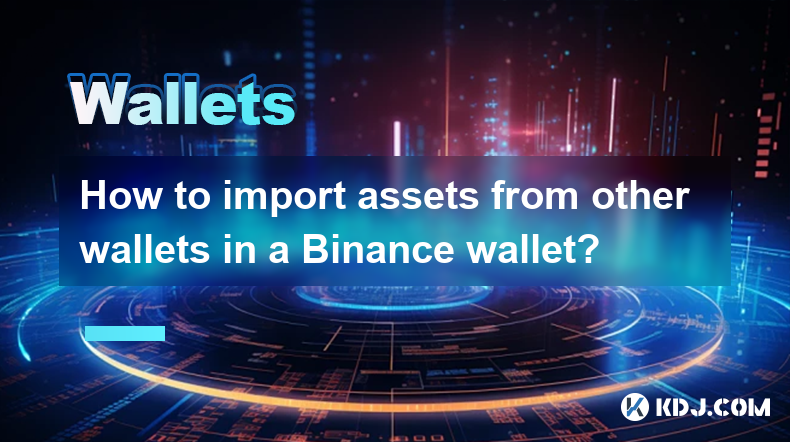
Key Points:
- Binance's approach to importing assets depends heavily on the type of asset and the originating wallet.
- The process generally involves obtaining the asset's private key or using a deposit address.
- Security is paramount; never share your private keys with anyone.
- Understanding the specific requirements for each cryptocurrency is crucial.
- Always double-check addresses before initiating any transfer.
How to Import Assets from Other Wallets into a Binance Wallet?
Importing assets from other wallets into your Binance wallet isn't a single, universal process. The method varies significantly depending on the type of asset (cryptocurrency, token) and the wallet you're transferring from. Binance doesn't offer a single "import" function like you might find with some other platforms. Instead, the process mirrors a standard cryptocurrency transfer.
Importing Cryptocurrencies:
Most cryptocurrencies are transferred using a deposit address. This is a unique address associated with your Binance account for a specific cryptocurrency. To find your deposit address:
- Log in to your Binance account.
- Navigate to the "Funds" or "Wallet" section.
- Select "Deposits".
- Choose the cryptocurrency you wish to deposit.
- Your deposit address will be displayed. Copy this address carefully.
Now, on your source wallet, initiate a withdrawal. You'll need to paste the Binance deposit address into the appropriate field on your source wallet's withdrawal interface. Confirm the transaction. Remember to double-check the address before proceeding. Incorrect addresses lead to irreversible loss of funds. The transfer time depends on the cryptocurrency's network.
Importing Tokens (ERC-20, BEP-20, etc.):
Tokens, such as ERC-20 tokens on the Ethereum network or BEP-20 tokens on the Binance Smart Chain, generally follow the same deposit address method as cryptocurrencies. However, it’s crucial to ensure you’re using the correct network. Sending an ERC-20 token to a BEP-20 deposit address, for example, will result in permanent loss of funds. Always verify the network compatibility between your source wallet and your Binance deposit address. Binance clearly indicates the supported network for each token.
Dealing with Hardware Wallets:
If your assets are stored on a hardware wallet (like Ledger or Trezor), the process is slightly more involved but follows similar principles. You'll initiate a withdrawal from your hardware wallet, providing the Binance deposit address as the recipient address. The hardware wallet will require confirmation through its interface, adding an extra layer of security.
Private Keys and Security:
Never share your private keys with anyone, including Binance support. Binance will never ask for your private keys. If someone requests your private keys, it's a scam. Private keys are the ultimate control over your cryptocurrency; losing them means losing access to your funds.
Understanding Network Fees:
Remember that transferring cryptocurrencies and tokens involves network fees. These fees vary depending on the network's congestion and the cryptocurrency itself. The source wallet will usually display the estimated network fee before you confirm the transaction. Factor this into your transfer planning.
Troubleshooting Common Issues:
- Transaction Pending: If your transaction is pending, it's being processed on the blockchain. The time it takes varies significantly depending on network congestion. Check the blockchain explorer for your specific cryptocurrency to track its progress.
- Transaction Failed: If your transaction failed, it's likely due to an incorrect address, insufficient funds (including network fees), or issues with your source wallet. Review all details carefully.
- Assets Not Showing Up: Allow sufficient time for the transaction to confirm on the blockchain. Once confirmed, the assets should appear in your Binance wallet. If they don't, contact Binance support.
Common Questions and Answers:
Q: Can I import all cryptocurrencies and tokens to my Binance wallet?
A: Binance supports a wide range of cryptocurrencies and tokens. However, it's crucial to check if Binance lists the specific asset you want to import before attempting a transfer.
Q: What if I made a mistake with the deposit address?
A: Unfortunately, there's little you can do if you sent your assets to the wrong address. Cryptocurrency transactions are irreversible. Contacting the recipient might be possible, but success is not guaranteed.
Q: How long does it take for assets to appear in my Binance wallet after a successful transfer?
A: The time it takes varies depending on the network congestion. Some transactions are near-instantaneous, while others can take several minutes or even hours to confirm.
Q: Is there a fee to import assets into Binance?
A: No, Binance itself does not charge a fee for importing assets. However, you'll incur network fees charged by the blockchain you are transferring from.
Q: What should I do if I suspect my Binance account has been compromised?
A: Immediately change your password, enable two-factor authentication, and contact Binance support. Review your transaction history for any unauthorized activity.
Q: My transaction is stuck. What should I do?
A: Check the blockchain explorer for your specific cryptocurrency to see the status of your transaction. If it remains stuck after a reasonable amount of time, contact Binance support. They may be able to assist in investigating the issue.
Disclaimer:info@kdj.com
The information provided is not trading advice. kdj.com does not assume any responsibility for any investments made based on the information provided in this article. Cryptocurrencies are highly volatile and it is highly recommended that you invest with caution after thorough research!
If you believe that the content used on this website infringes your copyright, please contact us immediately (info@kdj.com) and we will delete it promptly.
- The Crypto World Has Many Choices for Investors Who Want Safe Gains
- 2025-03-31 21:20:13
- Dogecoin (DOGE) Has a Turbulent Start to March, But Technical Indicators Hint at a Potential Bullish Turnaround
- 2025-03-31 21:20:13
- Dogecoin (DOGE) and Shiba Inu (SHIB) Whales Are Dumping to Buy Coldware (COLD)
- 2025-03-31 21:15:12
- Australia's financial crime regulator warns cryptocurrency ATM providers that many of these machines may be facilitating money laundering or defrauding victims
- 2025-03-31 21:15:12
- As Sui (SUI) Prepares to Unlock $151M, Coldware (COLD) Quietly Captures the Next Billion Users
- 2025-03-31 21:10:12
- Cryptocurrency investors are increasingly moving capital into stablecoins and tokenized real-world assets (RWAs)
- 2025-03-31 21:10:12
Related knowledge

How to easily generate a Bitcoin payment address
Mar 29,2025 at 10:49am
Generating a Bitcoin payment address might seem daunting, but it's actually quite straightforward. This process is crucial for receiving Bitcoin, as each transaction requires a unique address. Understanding how this works is fundamental to using Bitcoin effectively. This guide will walk you through the simple steps, regardless of your technical experti...
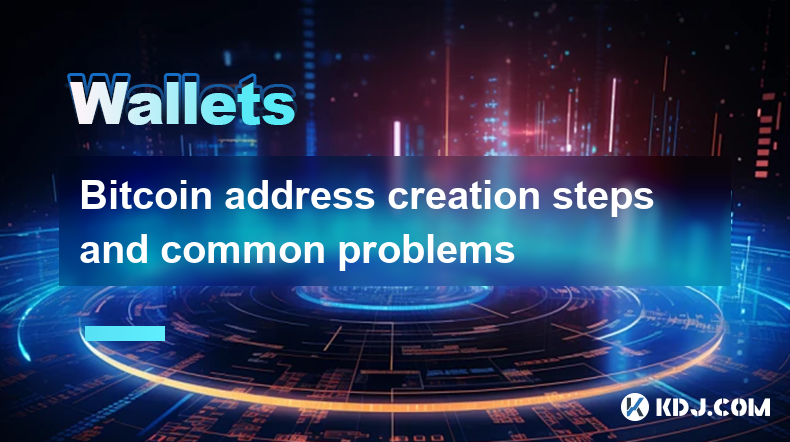
Bitcoin address creation steps and common problems
Mar 30,2025 at 06:07am
Understanding Bitcoin AddressesA Bitcoin address is a unique identifier, similar to a bank account number, used to receive Bitcoin. It's a string of alphanumeric characters generated from a public key, derived from your private key. Understanding the distinction between public and private keys is crucial for Bitcoin security. Your private key should be...
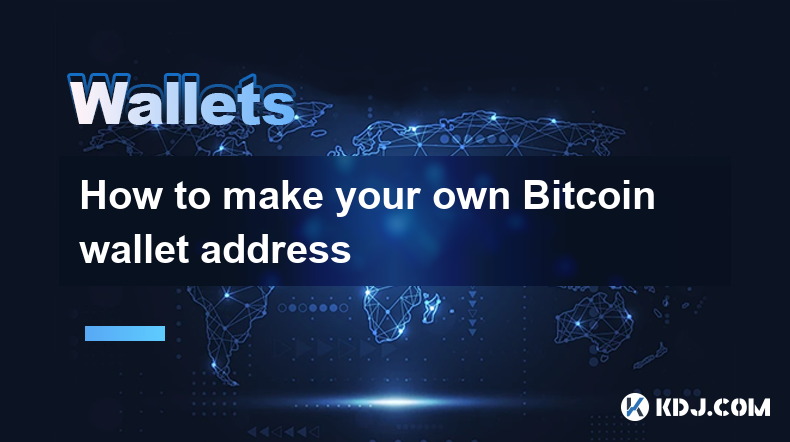
How to make your own Bitcoin wallet address
Mar 29,2025 at 08:42pm
Creating your own Bitcoin wallet address is crucial for securing and managing your Bitcoin holdings. It allows you to independently receive and send Bitcoin without relying on third-party services. This process involves understanding the different types of wallets and choosing the one that best suits your needs and technical expertise. Incorrectly gene...
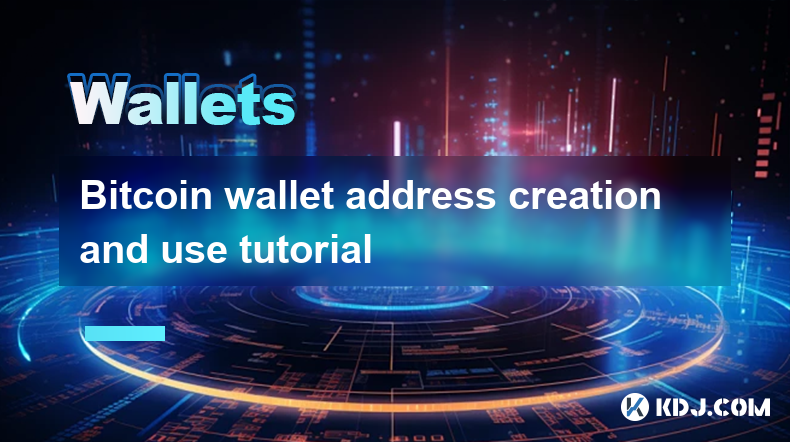
Bitcoin wallet address creation and use tutorial
Mar 29,2025 at 10:14pm
Understanding Bitcoin Wallet AddressesA Bitcoin wallet doesn't store Bitcoin in the way a traditional bank account does. Instead, it stores private keys, which are cryptographic secrets allowing you to access and spend your Bitcoin. Your Bitcoin address, on the other hand, is a public identifier, like an email address, that others can use to send you B...

Bitcoin address generation and secure storage guide
Mar 30,2025 at 08:07am
Understanding Bitcoin AddressesA Bitcoin address is essentially your public key, a string of alphanumeric characters used to receive Bitcoin. It's analogous to your bank account number. Unlike your private key, which is crucial for spending your Bitcoin, your address can be shared publicly without compromising your funds. Generating a new address is sim...
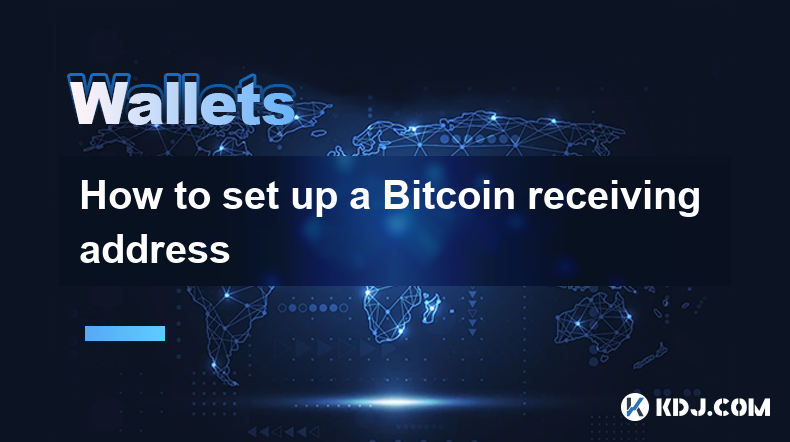
How to set up a Bitcoin receiving address
Mar 30,2025 at 06:14pm
Understanding Bitcoin Receiving AddressesA Bitcoin receiving address is essentially your unique identifier on the Bitcoin network. It's a string of alphanumeric characters that allows others to send Bitcoin to you. Think of it like your bank account number, but specifically for Bitcoin. You need a receiving address to receive Bitcoin. Crucially, you ca...

How to easily generate a Bitcoin payment address
Mar 29,2025 at 10:49am
Generating a Bitcoin payment address might seem daunting, but it's actually quite straightforward. This process is crucial for receiving Bitcoin, as each transaction requires a unique address. Understanding how this works is fundamental to using Bitcoin effectively. This guide will walk you through the simple steps, regardless of your technical experti...

Bitcoin address creation steps and common problems
Mar 30,2025 at 06:07am
Understanding Bitcoin AddressesA Bitcoin address is a unique identifier, similar to a bank account number, used to receive Bitcoin. It's a string of alphanumeric characters generated from a public key, derived from your private key. Understanding the distinction between public and private keys is crucial for Bitcoin security. Your private key should be...

How to make your own Bitcoin wallet address
Mar 29,2025 at 08:42pm
Creating your own Bitcoin wallet address is crucial for securing and managing your Bitcoin holdings. It allows you to independently receive and send Bitcoin without relying on third-party services. This process involves understanding the different types of wallets and choosing the one that best suits your needs and technical expertise. Incorrectly gene...

Bitcoin wallet address creation and use tutorial
Mar 29,2025 at 10:14pm
Understanding Bitcoin Wallet AddressesA Bitcoin wallet doesn't store Bitcoin in the way a traditional bank account does. Instead, it stores private keys, which are cryptographic secrets allowing you to access and spend your Bitcoin. Your Bitcoin address, on the other hand, is a public identifier, like an email address, that others can use to send you B...

Bitcoin address generation and secure storage guide
Mar 30,2025 at 08:07am
Understanding Bitcoin AddressesA Bitcoin address is essentially your public key, a string of alphanumeric characters used to receive Bitcoin. It's analogous to your bank account number. Unlike your private key, which is crucial for spending your Bitcoin, your address can be shared publicly without compromising your funds. Generating a new address is sim...

How to set up a Bitcoin receiving address
Mar 30,2025 at 06:14pm
Understanding Bitcoin Receiving AddressesA Bitcoin receiving address is essentially your unique identifier on the Bitcoin network. It's a string of alphanumeric characters that allows others to send Bitcoin to you. Think of it like your bank account number, but specifically for Bitcoin. You need a receiving address to receive Bitcoin. Crucially, you ca...
See all articles






















































































